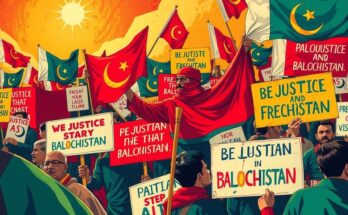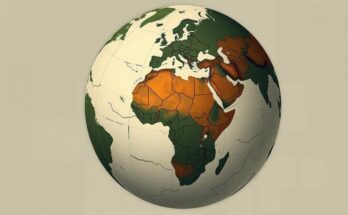Saudi authorities are called to end the misuse of administrative measures against released human rights defenders, including Loujain al-Hathloul and Maryam al-Otaibi. Both activists face unlawful travel restrictions that undermine their rights. International frameworks support their claims, but the Saudi system responds with silence and bureaucracy. The coalition of organizations demands accountability and independent monitoring of such violations.
Saudi authorities are urged to immediately stop using administrative and judicial measures against human rights defenders who have been released from prison, specifically highlighting activists Loujain al-Hathloul and Maryam al-Otaibi. These measures include arbitrary travel bans that violate their rights. Al-Hathloul has encountered bureaucratic hurdles in lifting her travel restriction that was meant to expire, leaving her in a limbo without clear communication from authorities concerning her status. International human rights frameworks advocate for the right to freedom of movement. The Universal Declaration of Human Rights and the Arab Charter on Human Rights emphasize that citizens should not be unjustly prevented from leaving their own nations. Likewise, Saudi Arabia’s own regulations specify that travel bans should be issued only under specific legal circumstances and that individuals should be informed of such decisions. Al-Hathloul has actively pursued legal avenues to challenge her travel ban, but her significant efforts have met with frustrating delays in the judicial system. The military bureaucracy seems more intent on thwarting her than providing answers. Unsettlingly, this pattern reflects broader issues of administrative harassment faced by many human rights defenders following their release. Maryam al-Otaibi’s case illustrates the ongoing dangers for women activists in Saudi Arabia. Despite her release, she faces a travel ban and judicial repercussions stemming from her brave stance against oppressive laws. After speaking out about her issues on social media, she was convicted of charges related to her online posts, further underscoring the repercussions of her activism in a climate resistant to change. United Nations experts have expressed concerns regarding the legality of the imposed travel bans but received inadequate explanations from Saudi authorities. This lack of transparency further complicates their claims to uphold human rights standards. Thus, a coalition of organizations is calling for an end to these unjust practices and demands that international monitors be allowed to observe and investigate such violations. In summary, vigilant advocacy is crucial as these human rights defenders endure continuous challenges. The world watches as Saudi Arabia is called upon to end arbitrary restrictions and uphold its international commitments to human rights. There remains hope that their courageous voices will be heard, prompting essential change in governance and law enforcement practices in the kingdom.
The campaign against human rights defenders in Saudi Arabia has ramped up recently, despite international treaties advocating for the protection of individuals’ freedom of movement. Prominent activists like Loujain al-Hathloul and Maryam al-Otaibi have faced punitive measures even after their release from imprisonment. They voice grievances about arbitrary restrictions that infringe upon their rights. This speaks to a larger context of state control over personal liberties within Saudi Arabia, especially for those advocating for reform. In light of international and domestic laws affirming individual freedoms, the continued enforcement of travel bans is alarming. The situation implicates various legal instruments intended to safeguard rights, yet they are frequently bypassed amidst bureaucratic inertia. Judicial recourse is essential, yet activists find themselves trapped in a tangle of denial and silence from the legal system, underscoring how systemic issues perpetuate insecurity for activists in the kingdom.
In conclusion, the ongoing harassment of human rights defenders like Loujain al-Hathloul and Maryam al-Otaibi highlights a troubling pattern in Saudi Arabia’s treatment of those advocating for change. The arbitrary nature of travel bans and the lack of judicial efficiency point to a broader systemic issue. Advocacy efforts need to intensify to push for accountability and ensure these activists can freely exercise their rights. The world must insist on the honor of commitments made to protect human dignity and liberty in all forms.
Original Source: www.hrw.org



